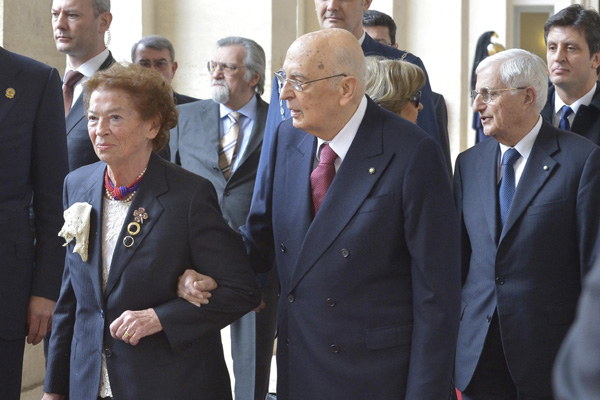Italian president steps down, ferment grows for successor
Updated: 2015-01-15 10:47
(Xinhua)
|
|||||||||||
 |
|
Italy's President Giorgio Napolitano (C) walks next his wife Clio as he leaves the Quirinale presidential palace in Rome January 14, 2015. [Photo/Agencies] |
Respected figures such as conductor Riccardo Muti or Mario Draghi, the current head of the European Central Bank (ECB), have also emerged as possible presidents. Local experts, however, say no real guessing is possible for a vote which has always been characterized by a high grade of unpredictability. Many believe the next president will be a compromise, balanced candidate.
In Italy most presidential duties are ceremonial as real political responsibility is upon the government. However, the president becomes a key player in case of instability as he has the power to dissolve parliament and form governments.
Prime Minister Matteo Renzi has repeatedly called confident that Italy would face no problem with the election, differently by April 2013, when Napolitano reluctantly accepted to be re-appointed for an unprecedented second tenure to avert a crisis after political parties were unable to agree on a successor.
Napolitano made it clear many times that he could not underestimate the signs of fatigue of his age thus would not complete his second term. But he promised to remain in office and speed the reform process until the end of Italy's six-month duty presidency of the European Union (EU).
In his address to the European Parliament in Strasbourg to close the Italian EU presidency, Renzi on Tuesday praised Napolitano as a "firm believer in Europe" driven by a desire for reform and who faced his country's difficult moments with "intelligence and wisdom."
Napolitano was born in Naples, an art city in southern Italy, and graduated in law from the University of Naples Federico II with a dissertation on political economy. In 1945 he joined the Italian Communist Party, of which he was a militant and then a leader.
He was elected to the Chamber of Deputies for the first time in 1953. In the 1970s he was an active lecturer abroad and by the 1980s his activity focused mainly on international and European policy issues.
From 1989 to 1992 Napolitano was a member of the European Parliament. Later he served as Italian Interior Minister in the Prodi government and chaired the Constitutional Affairs Committee of the European Parliament.
In May 2006 Napolitano was the first former Communist Party member to become Italy's president and was widely credited with helping to lead his country through the 2011 debt crisis. The need for political cooperation, moral values and anti-corruption fight have been his most treasured topics.
Napolitano was also author of several essays and books, and received various academic awards honoris causa. He has been married to Clio Bittoni for more than 55 years and the couple has two sons, Giovanni and Giulio.
Related Stories
10 investigated in Italy for possible ties with Islamic terrorism 2015-01-14 09:02
After deadly blaze, burnt-out ferry towed to Italy 2015-01-02 19:27
Rescued ferry passengers arrive in Italy 2014-12-29 17:38
Italy's Senate passes 2015 budget 2014-12-20 18:04
Old Chinese weapons travelling to Italy 2014-12-18 16:41
EU won't sanction France, Italy on budget yet 2014-11-28 21:51
Today's Top News
US, German leaders urge implementation of ceasefire deals in eastern Ukraine
Obama hosting UK's David Cameron for working dinner
Chinese fleet brings out the crowds in visit to Britain
Belgian police kill two in raid on suspected Islamists
Keeping in step with the shanghai beat
The Uygur who puts the accent firmly on Beijing
Thai railway project to commence in September
Italian president resigns
Hot Topics
Lunar probe , China growth forecasts, Emission rules get tougher, China seen through 'colored lens', International board,
Editor's Picks

|

|

|

|

|

|





